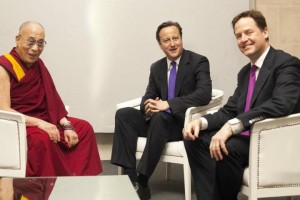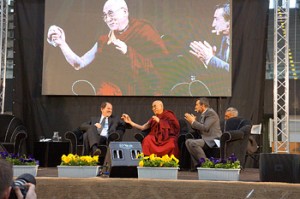
His Holiness the Dalai Lama with Prime Minister David Cameron and Deputy Prime Minister Nick Clegg at St. Paul’s Cathedral in London, UK, on May 14, 2012. Photo Clifford Shirley, Tibettoday
When deciding whether to officially meet the Dalai Lama or not, world leaders often face a tough dilemma. On the one hand, the spiritual head of the Tibetan people enjoys massive popular support, and meeting him can be beneficial for domestic endorsement while rejecting him can cause resentment. However, the Chinese government views ‘The Dalai Lama’s international activities [as a means to] colluding with international anti-China separatist forces to undermine relations between China and other countries so as to split the nation’. And because Western countries are becoming increasingly dependent on Chinese economic relations, the Chinese government is becoming increasingly successful in forcing leaders to refrain from meeting the Dalai Lama through ‘soft’ sanctions such as blocking diplomatic visits and economic deals.
Between 2005 and 2008, the Dalai Lama met 21 national leaders – in 2009 he only met two. According to the New York Times, in recent years ‘China has declared Tibet a “core interest” of national importance, and has been remarkably successful in lobbying foreign governments to refrain from meeting the Dalai Lama’. Smaller indebted countries with dependent economies such as Greece, which have been in desperate need of Chinese investments, have adopted an unsympathetic policy towards Tibet. Some countries have even actively supported the Chinese oppression of Tibet, for example the Hungarian authorities detained Tibetan protesters during a visit by the Chinese Premier of the State Council, Wen Jiabao, in 2011.
Not only the smaller economies are giving in to Chinese pressure: the USA, the world largest economy, has also on occasions rejected meeting the Dalai Lama. Prior to the presidential election in 2008, the Dalai Lama met both candidates John McCain and Barrack Obama. But after Obama was elected president, he avoided the Dalai Lama when the latter visited in October 2009. Many observers noted that the decision was made because ‘at the time, the White House was seeking China’s support on North Korea, Iran, climate change, and other issues’. This was the first time since 1991 that the spiritual head visited Washington without meeting the sitting president. The Dalai Lama eventually visited Obama in February 2010 and 2011, and immediately the Chinese complained that it was ‘seriously damaging’ the relationship between China and the U.S.
In 2011, under the cloud of global economic crisis the Dalai Lama went on a European tour, visiting Denmark, Estonia, Finland, France, Ireland and Sweden. However, he was only received by Toomas Ilves, president of Estonia, and the Chinese government immediately responded by cancelling ministerial meetings. It is not only in Europe that Chinese diplomatic pressure comes into effect. In Australia as well, Prime Minister Julia Gillard avoided meeting the Dalai Lama in the summer of 2011, arguing that ‘current Government arrangements [regarding Tibet] are appropriate’. And in October same year, the Dalai Lama was forced to cancel a scheduled trip to South Africa where he was to attend the 80th birthday of fellow Nobel-Prize winner Archbishop Desmond Tutu. South African authorities had had his application paperwork for weeks, but failed to issue him a visa on time. The incident happened only a week after China had agreed to invest $2.5 billion in various regional projects. The Dalai Lama had already been rejected entry to South Africa before, when he tried in vain to attend the 2010 World Cup in the country.
Despite the region being firmly rooted in Buddhism, The Dalai Lama is also being increasingly rejected in Southeast Asia which is dependent on Chinese trade and aid. In the last two decades, he has visited only two Southeast Asian countries: Indonesia in 1992 and Thailand in 1993. The Thai Secretary to the Minister of Foreign Affairs has been quoted as saying that Thailand ‘[generally] don’t allow anyone to use Thailand as a base country to do any political activities or instigate violence in other countries’. China is Thailand’s largest trade partner and has apparently pressured Thailand into rejecting the Dalai Lama, although he is not officially banned.

His Holiness the Dalai Lama during his talk “Happiness in a Troubled World” in Trento, Italy, April 11, 2013 Photo: Jeremy Russell OHHDL
Recently some heads-of-states have ignored the threat of Chinese sanction and met the Dalai Lama. In May 2012, UK PM David Cameron and Deputy PM Nick Clegg had a private meeting with the Tibetan spiritual leader. The Chinese foreign ministry immediately responded by saying that the meeting had ‘seriously interfered with China’s internal affairs’. Currently, the Dalai Lama is visiting Italy and Switzerland where he is attending official receptions. Still, it is evident that the global economic crisis has made national leaders more prone to Chinese pressure, as Beijing newspaper Global Times commented after the British meeting with the Dalai Lama last summer: ‘few countries can afford to be really tough against China’.




 Print
Print Email
Email